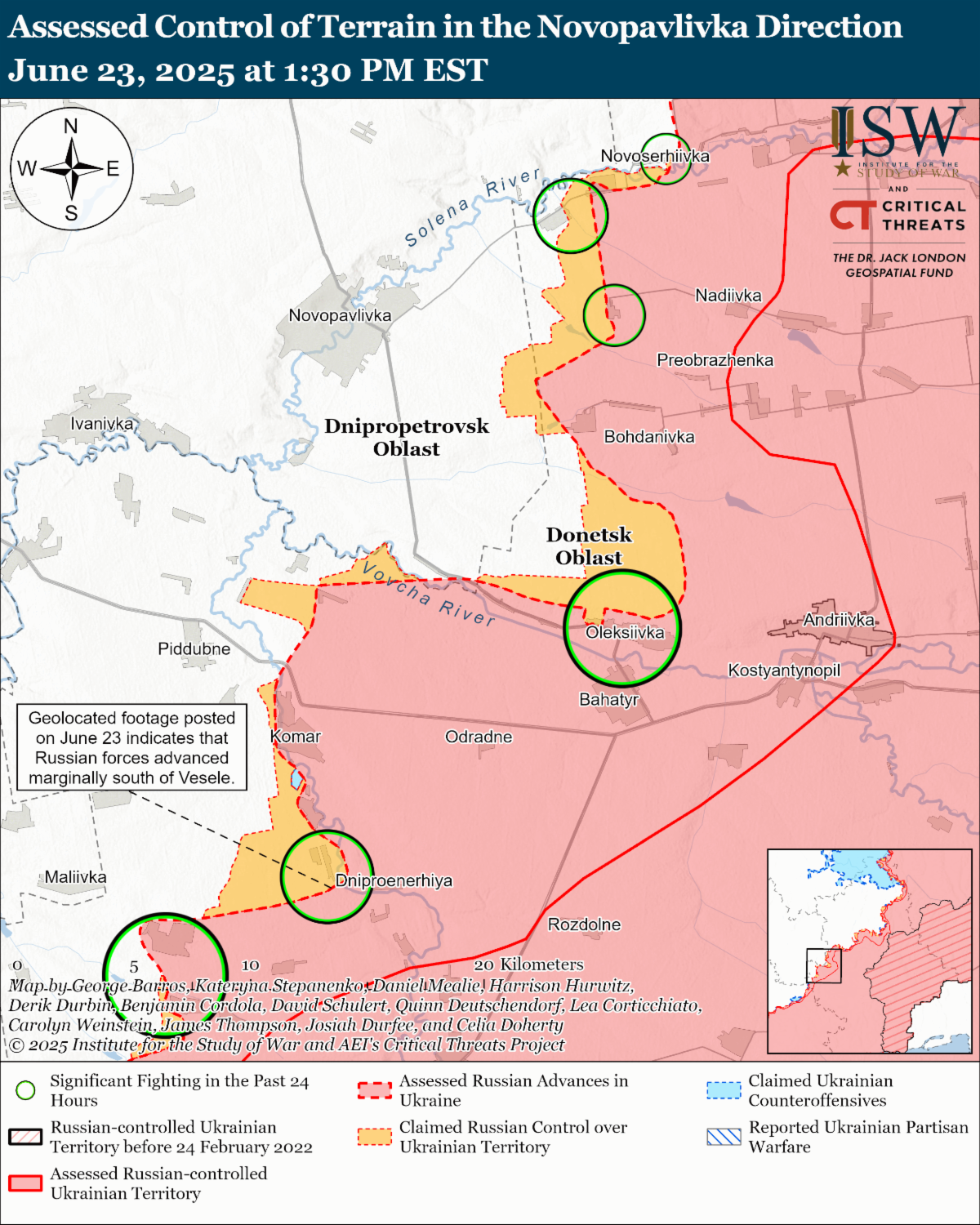The Kremlin continues to only diplomatically support Iran, showcasing the limitations in the Russian-Iranian strategic relationship. Russian President Vladimir Putin, Russian Foreign Minister Sergei Lavrov, Russian Presidential Aide Yuriy Ushakov, and Chief of the Russian General Staff's Main Directorate (GRU) Igor Kostykov met with Iranian Foreign Affairs Minister Abbas Araghchi in Moscow on June 23. Putin claimed that Russia’s position on the Israel-Iran conflict is well-known and that the Russian Ministry of Foreign Affairs (MFA) has raised Russia’s concerns at the United Nations (UN) Security Council. Putin also claimed that recent Israeli and American strikes against Iran were unprovoked and unjustified and that Russia is making every effort to help the Iranian people. Araghchi thanked Russia for its strong condemnation of the strikes against Iran and claimed that Iran regularly consults with Russia on issues of global security, as Russia and Iran’s relations have become "strategic in nature." Unspecified Iranian sources told Reuters on June 23 that Iran has not been impressed with Russia's support so far and wants Putin to do more to back Iran against Israel and the United States. Reuters reported that an Iranian source stated that Iranian Supreme Leader Ali Khamenei sent Araghchi to Moscow to deliver a letter from Khamenei to Putin requesting more assistance from Russia. ISW continues to assess that Russia is constrained in its ability to provide direct support to Iran due to its war in Ukraine and has likely resigned itself to providing diplomatic overtures for the time being.
Russian officials are attempting to influence conversations about increasing NATO defense spending by misrepresenting Russia's ongoing efforts to restructure and expand Russia's military capabilities as a defensive reaction to NATO. Russian President Vladimir Putin met with graduates of Russia's military academies on June 23 and acknowledged that NATO member states will likely announce a significant increase in defense spending and efforts to increase NATO military capabilities at the upcoming summit on June 24 and 25. Putin claimed that this meeting would clarify that NATO is the party provoking "global militarization" - not Russia. Putin stated that Russia will continue to take steps to strengthen Russia's security and develop the Russian Armed Forces to guarantee Russia's sovereignty. Russian Deputy Foreign Minister Alexander Grushko told the Russian state news agency RIA Novosti on June 23 in an article ahead of the upcoming NATO summit that the European Union (EU) is accelerating its militarization and that Russia will take all necessary measures and countermeasures, "including preemptive ones," to ensure Russia's security. Grushko reiterated that Russia considers the possibility of Ukraine joining NATO to be a "direct threat" to Russia's security and stated that Russia is seeking "ironclad" guarantees that Ukraine will not join NATO, which Grushko stated includes repealing the 2008 Bucharest Summit Declaration that welcomed Ukraine's and Georgia's intention to join NATO. ISW has previously reported that Russian officials leverage escalatory rhetoric and threats during key moments of Western debates on military assistance for Ukraine in order to scare Western leaders into inaction, and Russian officials are likely again attempting to leverage threats to dissuade NATO member states from supporting increased defense spending.
Putin announced during his speech to the graduates on June 23 that Russia will complete some of its ongoing force restructuring efforts in 2025.[8] Putin stated that Russia is urgently working to increase the Russian Armed Forces' combat capabilities and reiterated that Russia is standing up the Unmanned Systems Forces as a new branch of the Russian military. Putin stated that Russia will complete the formation of the Moscow and Leningrad military districts (MMD/LMD) and will reorganize Russia's naval infantry brigades into divisions in 2025. Putin stated that Russia is also undertaking a long-term technical modernization effort in the army and navy, modernizing its Strategic Missile Forces, beginning serial production of Oreshnik ballistic missiles, and producing new ships and submarines for the Russian Navy. Former Russian Defense Minister Sergei Shoigu announced Russia's intention to form the MMD and LMD and reorganize Russia's naval infantry brigades into divisions in the medium-term in December 2022. Russian officials had not previously provided a firm date for the completion of these efforts. ISW continues to assess that Russia's military reforms, particularly in the MMD and LMD in western Russia along its border with NATO, demonstrate Russia's longer-term preparation for a possible future conflict with NATO. These military reforms come after Kremlin officials have repeatedly threatened NATO states, including the Baltic states and Finland.
Key Takeaways:
- The Kremlin continues to only diplomatically support Iran, showcasing the limitations in the Russian-Iranian strategic relationship.
- Russian officials are attempting to influence conversations about increasing NATO defense spending by misrepresenting Russia's ongoing efforts to restructure and expand Russia's military capabilities as a defensive reaction to NATO.
- Putin also acknowledged his ongoing efforts to empower Russia's internal security services in order to safeguard regime stability and internal security.
- Russian forces conducted a large-scale combined drone and missile strike against Ukraine on the night of June 22 to 23 that largely targeted Kyiv City and killed at least seven people and injured 28.
- Ukraine's Western partners continue to allocate military aid to Ukraine and collaborate with the Ukrainian defense industrial base (DIB).
- Ukrainian forces advanced in northern Sumy Oblast. Russian forces advanced near Kupyansk, Borova, Pokrovsk, and Novopavlivka and in Sumy Oblast.
| 




 [ISW] 이란 업데이트 특별 보고서, 2025년 6월 23일, 저녁 에디션
[ISW] 이란 업데이트 특별 보고서, 2025년 6월 23일, 저녁 에디션
 [ISW] 러시아 점령 업데이트, 2025년 6월 23일
[ISW] 러시아 점령 업데이트, 2025년 6월 23일